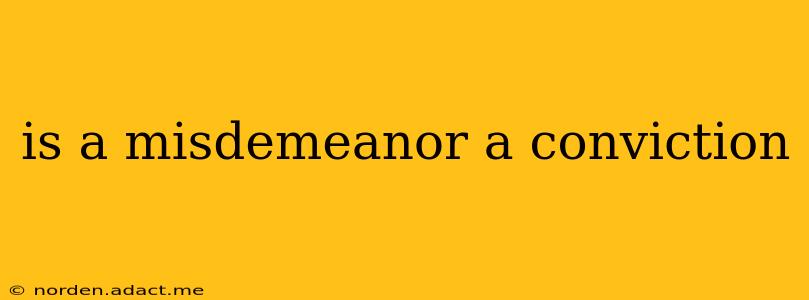Is a Misdemeanor a Conviction? Yes, But With Nuances
Yes, a misdemeanor is a criminal conviction. However, the term "conviction" itself carries weight and implications that require understanding the nuances of the legal system. A misdemeanor conviction is a formal finding of guilt for a less serious crime than a felony, but it still represents a significant legal consequence. This means it's recorded on your criminal record and can have lasting effects on your life. Let's explore this in more detail.
What is a Misdemeanor?
A misdemeanor is a less serious crime than a felony, typically punishable by a fine, jail time of less than one year (often served in a county jail rather than a state prison), probation, and/or community service. The specific penalties vary widely depending on the jurisdiction (state or local) and the nature of the offense. Examples include petty theft, simple assault, vandalism, and driving under the influence (DUI) – though the specifics of DUI charges can sometimes lead to felony charges depending on circumstances.
What Does a Misdemeanor Conviction Mean?
A misdemeanor conviction means a court has officially found you guilty of committing a misdemeanor offense. This judgment has lasting legal implications. It becomes part of your criminal record, accessible through background checks. This record can impact various aspects of your life, including:
- Employment: Many employers conduct background checks, and a misdemeanor conviction can negatively affect your chances of getting hired, especially for certain professions.
- Housing: Landlords may conduct background checks, and a conviction could affect your ability to secure housing.
- Education: Some educational institutions may consider criminal history when making admissions decisions.
- Travel: Certain countries may deny entry to individuals with criminal convictions.
- Professional Licenses: Many professions require licensing, and a misdemeanor conviction could impact your eligibility or renewal of a license.
How is a Misdemeanor Conviction Different from a Felony Conviction?
The key difference lies in the severity of the crime and the potential punishment. Felonies are more serious crimes, typically involving harsher penalties like longer prison sentences (often exceeding one year), significant fines, and more extensive collateral consequences. A felony conviction carries much heavier weight than a misdemeanor conviction.
Can a Misdemeanor Conviction Be Expunged or Sealed?
In some jurisdictions, it's possible to have a misdemeanor conviction expunged or sealed from your record after a certain period of time and with a clean record following the conviction. This process effectively removes the conviction from public view. However, the eligibility criteria and procedures vary widely by state and even county. Legal counsel is advisable to explore this option.
What are the Consequences of a Misdemeanor Conviction?
The consequences are multifaceted and depend on several factors including the specific crime, the jurisdiction, and your past criminal history. Besides the direct penalties (fines, jail time, probation), indirect consequences can include:
- Difficulty obtaining loans or credit.
- Loss of voting rights (in some states).
- Increased insurance premiums.
- Emotional and psychological distress.
What if I was found Guilty but the Charges were Dropped?
If charges were dropped before a formal conviction, there is no conviction on your record. A guilty plea or finding of guilt are necessary for a conviction to exist. However, the arrest itself may still be visible in some background checks, although its impact is typically significantly less than a conviction.
In conclusion, a misdemeanor is indeed a criminal conviction with far-reaching implications. Understanding the potential consequences is crucial to mitigating their impact. If you have any concerns about a misdemeanor conviction, seeking advice from a legal professional is strongly recommended.
